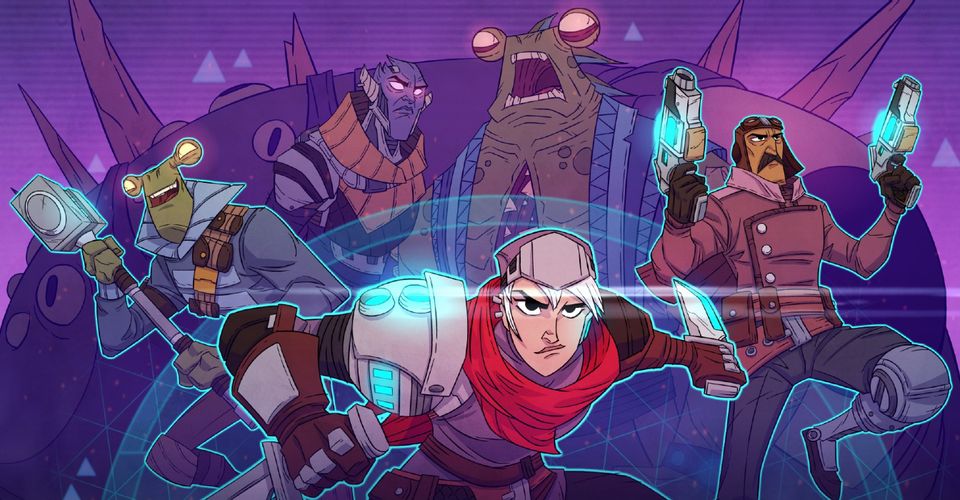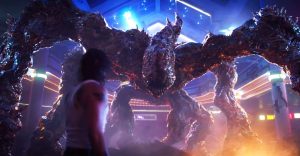Griftlands Review: Deckbuilding Narrative Excellence

Griftlands, developed and published by Klei Entertainment, is a roguelike deckbuilding game. Having recently left early access on Steam, the title is now available on PC, Nintendo Switch, PlayStation 4, and Xbox One, and excels within its genre by offering a mixture of familiar trappings alongside unexpected focus on an oft-discarded element of the deckbuilding game: narrative.
While some of the best roguelike titles in recent memory, such as Hades, have placed an incredible importance on a strong story, many of the deckbuilding genre’s most familiar entries don’t do the same. Games like Slay the Spire and Monster Train are excellent, but don’t offer much in the way of character investment or intrigue, with only the barest hints of fantasy or sci-fi elements to sustain the illusion of a grander narrative. Griftlands is, in many ways, defined by its choice to hone in on story rather than shed it, and the end result is an excellent, innovative deckbuilder that is easy to sink hours into.
Griftlands allows players to pick up the story of three different characters, each with their own goals and interactions. As the story progresses, these characters will be faced with several different choices, each of which offers unique boons or detriments that will make the journey feel different than the one played immediately before it. Allies are made and enemies are gathered, and by the end of the journey – should the hero be so lucky as to make it there – their actions have consequences, resulting in a showdown that can still go one of several ways.

Each character has two decks, one for battle and one for negotiation. While some encounters are scripted such that a battle is unavoidable, many allow for a choice between negotiation or combat. Each deck can be built to work with a different approach, and resources like additional cards and “grafts” (power-ups) are collected as the game progresses. Cards are upgraded either through random events or by simply playing them repeatedly over the course of a journey.
Griftlands also has an overworld map that lets players visit a variety of locations, whether it be shops or encampments. As the story unfolds, they’ll be given the opportunity to rest to heal wounds (combat) and steel their resolve (negotiation), and days progressing unlock additional quests, circumstances, and resources. Should a player die, they’ll get the chance to return with boons from a previous run, and a game-wide progression system makes characters more powerful the more runs they’ve been taken on. It’s standard roguelike deckbuilding stuff, but it’s executed in a captivating way.

There’s little not to like about Griftlands provided card battling is of interest. The game’s graphics are smooth and charming, with many of the recurring characters distinguished by nuanced personality traits and representation. Perhaps over a series of dozens of runs through the same narrative, things might begin to grow tiresome, but over a few dozen hours the game provides enough variety with its characters, deckbuilding strategies, and story options that it seems like a concern for much longer into the game’s life cycle.
That said, Griftlands may innovate on some roguelike deckbuilding mechanics, but it’s still very much an entry into that niche genre, with all the warts that comes with. Strategies can be unproductively complex for those looking for a casual pick-up-and-play sort of game, and the game’s narrative focus means each run tends to last significantly longer than it might in similar titles like Loop Hero. One thing Griftlands does manage to avoid is the implementation of more complex mechanics that are significantly harder to corral into a workable deck philosophy, something that isn’t necessarily a bad thing in games with quick play sessions but would be unproductively frustrating were it present here.

Overall, Griftlands does what it sets out to do, offering a wholly compelling and unique take on its genre influences. It’s yet another excellent entry into roguelike deckbuilding experiences and is immediately memorable thanks to its reliance on world-building and character depth. Even better, the story of Griftlands is a fun jaunt through a sci-fi world that is buoyed by an even more exciting card game. Those who loved Hades, Slay the Spire, or similar games will find just as much to love in Griftlands.
Griftlands is available now on PC, Nintendo Switch, PlayStation 4, and Xbox One. Screen Rant was provided with a Steam digital download code for the purpose of this review.
About The Author


















